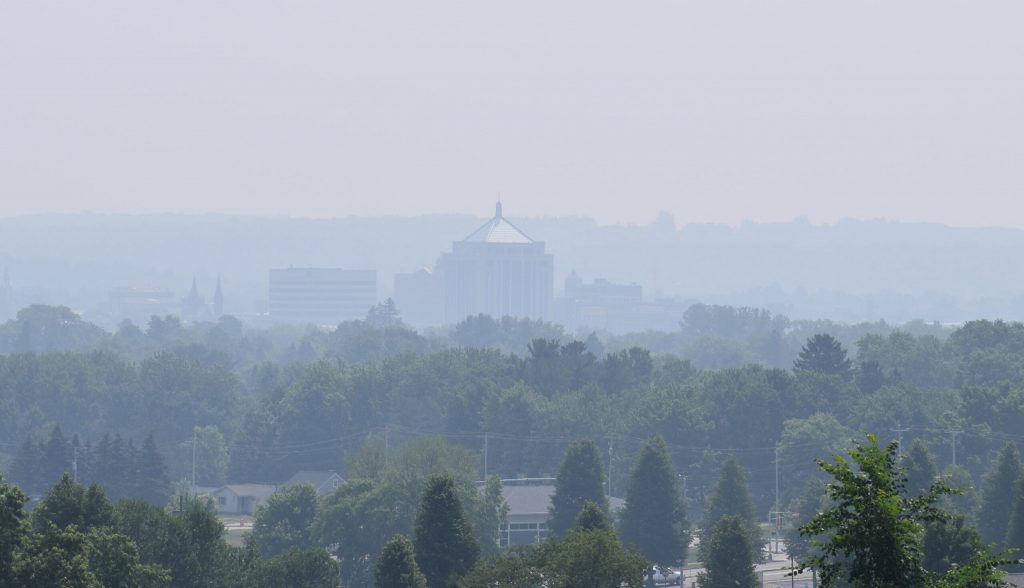70 Partners in Wisconsin Form Coalition to Promote Climate Action
Announced on Earth Day, seeking community support, solutions to climate change.

In central Wisconsin, smoke from Canadian wildfires obscures the view of Wausau, Tuesday, June 27, 2023. Rob Mentzer/WPR
A new coalition of more than 70 state, national and tribal partners has formed with the goal of improving public health for Wisconsin residents in the face of climate change.
The coalition called Climate & Health Action Together, or CHAT, announced its formation on Earth Day, looking to share stories about impacts from climate change in Wisconsin.
“CHAT is committed to tackling these challenges head-on by talking about them, then fostering community engagement and promoting community level solutions that empower individuals and organizations to take meaningful steps toward a healthier future,” Novinska-Lois said.
John Meurer, a Milwaukee pediatrician and professor at the Medical College of Wisconsin, recalled treating a 3-year-old girl suffering from heat stroke last summer when temperatures reached 94 degrees Fahrenheit on a June day in Milwaukee.
“Fortunately, she recovered. But her case was a stark reminder that extreme heat, now the leading cause of weather related deaths, is no longer a distant danger,” Meurer said. “It’s already affecting the most vulnerable members of our community.”
A 2020 report from the Global Health Institute at the University of Wisconsin-Madison found the number of days hotter than 90 degrees is likely to triple in Wisconsin by mid-century, and Milwaukee could see three times as many days with a heat index above 105 degrees by 2050.

Brittany Caple, right, and her 3-year-old son, Abraham, cool off in the pool Monday, June 20, 2022, at Palmer Park in Janesville, Wis. Angela Major/WPR
Jennifer Gauthier, a member of the Menominee Nation, directs the Sustainable Development Institute at the College of Menominee Nation. She said the community has pursued alternative energy sources to ensure reliable power and changed gathering practices due to warmer temperatures and extreme rainfall.
For example, Gauthier said they’ve seen shifts with tapping sugar maple trees to harvest sap, which she said usually takes place in April.
In Wisconsin, temperatures have increased by around 3 degrees. Average precipitation has also increased about 17 percent since the 1950s, according to the latest report from the Wisconsin Initiative on Climate Change Impacts.
Michelle Danforth-Anderson, marketing and tourism director for the Oneida Nation, said extreme rains in recent years have affected the tribe’s thousands of acres of crops that include wild rice.
“If we get excessive rains, it can wash out our rice beds, and that impacts what we can harvest in the beginning of August,” Danforth-Anderson said.
She added that last year’s record warm winter caused their 4,000 apple trees to blossom early. That was followed by a hard freeze that resulted in the loss of 85 percent of their crop, impacting the orchard’s business and food distribution to community members.
As temperatures warm, Rachel Pierce, a nurse practitioner in Eau Claire, recalled treating a 4-year-old girl who experienced fevers, chills and swollen joints due to Lyme disease.
Warmer and wetter weather can increase the risk of illness from ticks because they thrive in warm, humid weather, according to the Wisconsin Department of Health Services.
As climate change drives temperatures higher, Joan Schiller, a medical oncologist in southcentral Wisconsin, said that’s set the stage for wildfires to burn. She said air pollution from wildfire smoke and burning of fossil fuels is responsible for about 14 percent of all lung cancer deaths worldwide.
“I recall a young mother who never smoked yet was diagnosed with non-small cell lung cancer at the age of 35,” Schiller said. “She was a physician, a mother of two and a long-distance runner. She died of metastatic lung cancer about two years after her diagnosis.”
The coalition highlighted the harms of climate change on human health as President Donald Trump has declared a national energy emergency and pledged to “drill, baby, drill.” The Trump administration has also withdrawn the nation from the Paris climate agreement, which aims to ward off the worst effect of global warming.
According to the administration, the climate emergency declaration will help speed building, create jobs and prosperity, and strengthen national security.
Meurer also alluded to the Trump administration’s recent decision to fast-track permitting for Enbridge’s plans to build a tunnel to house its Line 5 oil and gas pipeline in the Great Lakes, as well as a pause on funding for electric vehicle charging stations in Wisconsin.
More than 70 partners in Wisconsin form coalition on Earth Day to promote climate action was originally published by Wisconsin Public Radio.
If you think stories like this are important, become a member of Urban Milwaukee and help support real, independent journalism. Plus you get some cool added benefits.





















